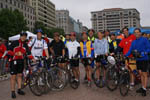
Commuters throughout the metropolitan Washington region traded in their cars for bicycles to participate in the annual Bike to Work Day event and promote bicycling to work as a healthy and environmentally-sustainable alternative to drive-alone commuting.
Over 6,300 bicyclists and elected officials from the metropolitan Washington area turned out at 25 different sites across the National Capital Region.
Bike to Work Day is an event organized by the Metropolitan Washington Council of Governments (COG) Commuter Connections Program and the Washington Area Bicyclists Association (WABA) during National Bike Month in May.
“Bicycling in the Washington metropolitan area is well within reach for more commuters than you might think. In fact, the average bike commute is 8.2 miles each way,” said Phil Mendelson, vice-chair of the NCR Transportation Planning Board. “The benefits of bicycling far outweigh drive alone commuting. Bicycling to work is also a great way to add a fitness regimen into your daily routine, reduce environmental pollution and reduce traffic congestion,” he added.
Elected officials encouraged participants to continue bicycling to work as a way to help reduce traffic congestion and air pollution, especially in upcoming months when warm temperatures increase the negative effects of ozone, a harmful gas formed when the sun heats polluted air.
One of those elected officials was District of Columbia Mayor Adrian Fenty, who rode in a convoy through the city to Freedom Plaza to congratulate participants for supporting a greener and healthier city.
“Our governments are working together to support funding to build better trails and infrastructures for bicycling in the area," said Adrian Fenty. "I want to encourage as many people as possible to leave their cars at home and cycle to work. Supporting alternative commuting methods such as bicycling is important because we want to make this city environmentally friendly and healthy for workers and residents.”
Congresswoman Eleanor Holmes-Norton urged participants to keep using bicycling as a commuting alternative. She also vowed to urge congress to provide further funding for building better paths to make the region more bicycle friendly
“Bikes are important," Holmes-Norton said. "This is a good day and a good opportunity to stress fighting the car culture. We have to have a day that calls attention to finding alternatives to cars and other modes of transportation,” said Congresswoman Eleanor Holmes-Norton.
Addressing bicyclists' concerns about road and trail safety, speakers mentioned a yearly bicycling clinic hosted by WABA called Confident City Cycling. The classes equip both novice and experiences riders with the skills needed to use their bicycles in the city, educating them on safely sharing the road with cars, other bikes, and pedestrians.
The event also showcased other alternative commute programs such as the Guaranteed Ride Home Program, a free service of Commuter Connections that provides up to four emergency rides per year to commuters who bicycle, vanpool, carpool, walk, or take mass transit at least twice a week.
“Today’s Bike to Work Day event was the largest since we started the event in this area. I hope this means many more people will be commuting to work more often via bicycle instead of cars. With the increase in gas prices, who would not want to use an affordable means of transportation,” said Eric Gilliland, executive director of WABA. “I hope we get an even larger turnout next year,” he added.
Commuter Connections is a program of the National Capital Region Transportation Planning Board at the Metropolitan Washington Council of Governments and is funded by the District of Columbia, Maryland and Virginia Departments of Transportation as well as the U.S. Department of Transportation.. Commuter Connections promotes bicycling to work and other alternatives to drive-alone commuting, and provides free ridematching for carpools and vanpools and also offers the free regional Guaranteed Ride Home program.
The Washington Area Bicyclist Association creates a healthy, more livable region by promoting bicycling for fun, fitness, and affordable transportation; advocating for better bicycling conditions and transportation choices for a healthier environment, and educating children, adults, and motorists about safe bicycling.